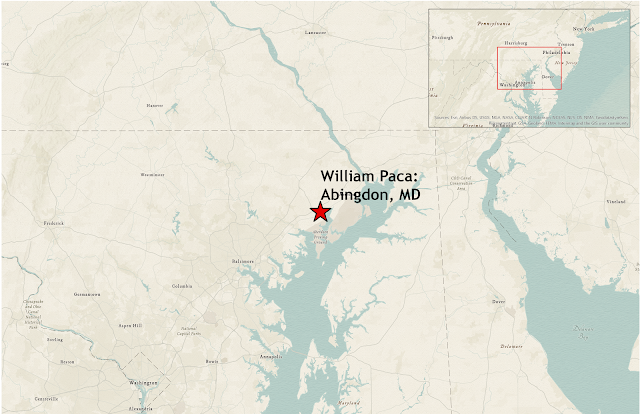Founding Fathers - William Paca
William Paca
Born: October 31, 1740 (Abingdon, Maryland)
Died: October 13,1799 (Wye Island, Maryland)
Since I made a point last week of bringing up the frequency of certain names, it seems fitting that we now allow the men of the William contingent to catch up with Thomas as the most frequent given name among our Founding Fathers. Our fifth member of this particular group is William Paca (pronounced PAY-kuh), who was one of seven children born to his affluent parents, John and Elizabeth Paca. Despite having a wealthy family, William was the youngest of the two boys and was therefore not in line to inherit much of an estate. Consequently, it was important that he receive an education and learn a vocation that would provide him the best path to become successful. John Paca made sure that young William did receive a quality education as a child, and at the age of fifteen he entered the College of Philadelphia to study law. He received his bachelor's degree there in 1759 and, after traveling to London to study at the prestigious Middle Temple until 1761, returned to Annapolis in preparation to begin his law practice. The following year he requested a master's degree from Philadelphia, which only required that a graduate be in good standing and not that they continue their studies, and was soon admitted to the bar in Maryland in 1764. William's education and family background had prepared him for a successful career, and his marriage to Ann Mary Chew gave him connections to many of her prominent relatives throughout Pennsylvania and Maryland. The couple eventually had three children together.
In order to improve his speaking skills while also expanding his social sphere, William Paca established the Forensic Club in Annapolis, through which he developed a close friendship with Samuel Chase. The pair would discuss and debate many political and philosophical topics of the day, and when the Stamp Act was enacted they helped create the local chapter of the Sons of Liberty. The resulting popularity for Paca helped him win his first political seat in 1766 when he won election to the city's Common Council. One year later he was elevated to the Maryland House of Delegates, where he served until the assembly's final year in 1774, regularly writing on behalf of the cause for independence while letting others like Chase do most of the speaking. That year was especially turbulent as Paca's wife died, likely due to complications from childbirth. Although he was deeply saddened by the loss of "Molly", as he called her, Paca distracted himself with political work as the gap between Britain and the colonies continued to widen. He was sent as a delegate from Maryland to both the First and Second Continental Congresses, and signed the Olive Branch Petition before eventually casting his vote in favor of independence and signing the Declaration.
During the war, William Paca served in many roles. He remained in Congress until 1777 while also being elected to the newly-created Maryland Senate, where he was part of a commission tasked with securing the Eastern Shore that bordered with Delaware against seditious activity. He remarried in 1777 at the age of 36 to Ann Harrison, who was just 20 at the time, and this second union resulted in the birth of one child. Paca had fathered two illegitimate children between his marriages, a mixed-race daughter born during his time in Philadelphia as well as a daughter in Annapolis after his return home, and although he did not take them into his home to raise he did provide for their education and well-being. In 1780, Paca was once again widowed as Ann succumbed to a long illness, and he remained single for the rest of his life. He resigned from both Congress and the state assembly in order to assume his new role as a judge in the Court of Admiralty, but in 1782 he was obliged to also resign that position because he had been elected governor of Maryland. Winning re-election each of the following two years, Paca served the maximum term allowed by the state constitution at the time, and he was in office when Congress met in Annapolis to ratify the Treaty of Paris. Interestingly, he was immediately elected to both Maryland's Senate and House, but chose to take his seat in the latter because he believed it to be more responsive to the will of the people. As a firm believer in state and individual rights, Paca was an ardent Antifederalist and had many reservations about the proposed government that would replace the Articles of Confederation. Although he eventually supported the passage of the Constitution, he strongly argued for guaranteed rights that formed the basis of the original amendments - the Bill of Rights. President George Washington appointed him as a judge to Maryland's District Court late in 1789, and Paca held that seat for ten years. He died at his home on Wye Island along the east side of Chesapeake Bay in 1799, less than three weeks shy of his 59th birthday, and was buried there in a family cemetery on his property.
The signature of William Paca can be found as the third name on the third (center) column beneath the Declaration of Independence.



Comments
Post a Comment